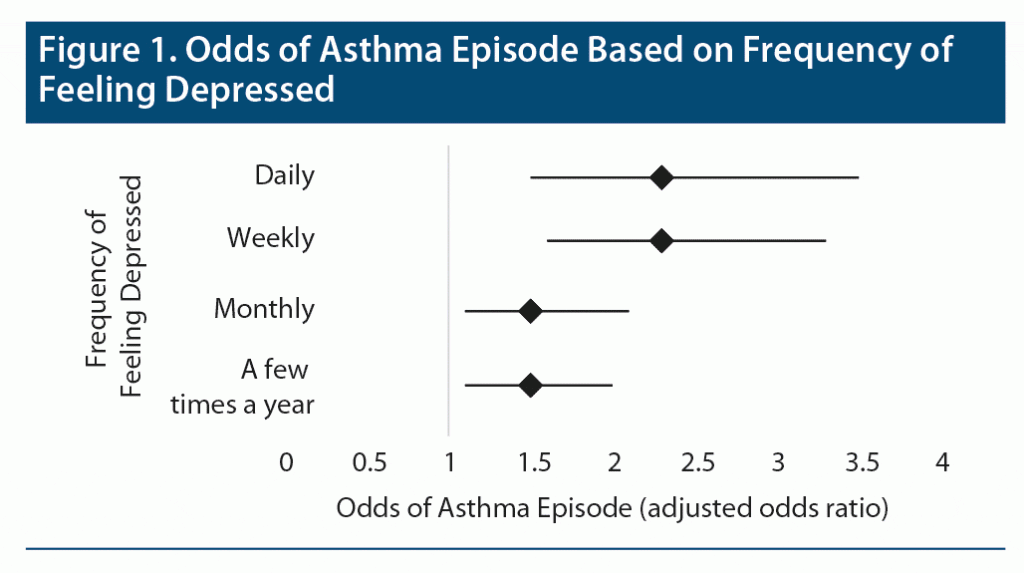Prim Care Companion CNS Disord 2023;25(1):22br03323
To cite: Misra S, Desai S, Ray A. The impact of depression on asthma episodes in the US population. Prim Care Companion CNS Disord. 2023;25(1):22br03323.
To share: https://doi.org/10.4088/PCC.22br03323
© 2023 Physicians Postgraduate Press, Inc.
aDepartment of Internal Medicine, Ascension Saint Joseph Hospital, Chicago, Illinois
bDepartment of Psychiatry, Tower Health—Phoenixville Hospital, Phoenixville, Pennsylvania
cDepartment of Pulmonary and Critical Care Medicine, Ascension Saint Joseph Hospital, Chicago, Illinois
*Corresponding author: Saral Desai, MD, Tower Health—Phoenixville Hospital, 140 Nutt Rd, Phoenixville, PA 19460 ([email protected]).
Depression and asthma are highly prevalent chronic conditions in the United States that are associated with high socioeconomic burdens on the health care system.1 Systematic reviews and population-based cohort studies have reported a strong link between psychosocial factors and asthma with no clear temporal association.2 Asthma episodes can increase emergency department visits, contributing to increased costs and potentially increasing mortality.3 This study investigated the association between the severity of depression and asthma episodes in the US population.
METHODS
We performed a retrospective analysis of the Centers for Disease Control’s National Health Interview Survey (NHIS) 2020 data, which monitors the health of the US population through the collection and analysis of data on a broad range of health topics. It uses a single-stage probability sample design that systematically selects the sample from defined clusters of samples with a face-to-face interview format including adults aged ≥ 18 using computer-assisted personal interviewing. We performed univariate analysis using the Rao-Scott χ2 test for categorical variables and the unpaired Student t test or Wilcoxon test for continuous variables. Multivariable survey logistic regression analysis was performed to establish an association between asthma episodes and depression.
RESULTS
Of a total of 31,568 participants, 4,483 (14.2%) reported ever having asthma. Among those participants ever having asthma, 25% experienced an asthma episode within the past 12 months. Compared to nondepressed participants with asthma, asthma episodes were reported the most by participants who felt depressed daily, followed by weekly, monthly, and a few times a year (41.4% [nondepressed] vs 37.4% [daily] vs 27.6% [weekly] vs 25.3% [monthly] vs 18.7% [few times/year], P < .0001). In regression analysis, after controlling for age, sex, race, preventative medications for asthma, and smoking status, compared to participants who did not feel depressed, participants feeling depressed daily (adjusted odds ratio [aOR] = 2.3; 95% CI, 1.5–3.5; P < .0001), weekly (aOR = 2.3; 95% CI, 1.6–3.3; P < .0001), monthly (aOR = 1.5; 95% CI, 1.1–2.1; P = .04), and a few times a year (aOR = 1.5; 95% CI, 1.1–2.0; P = .004) were at higher odds of having an asthma episode. Figure 1 shows the odds of asthma episodes based on the frequency of feeling depressed.
DISCUSSION
We found a positive correlation between the frequency of feeling depressed and having an asthma episode using nationally representative data. A bidirectional relationship between asthma and depression was established previously in population-based cohort studies in China and South Korea.2 A subset of Dallas Heart Study patients with asthma were found to have higher odds of mental health–associated diagnoses.4 Our findings demonstrate a correlation between the severity of depression and the odds of asthma episodes using an updated US national survey among nonhospitalized patients. One theory suggests that high inflammatory mediators associated with depression may have a pathogenic role in asthma.
A cross-sectional study5 from 2007 to 2012 National Health and Nutrition Examination Survey data provided the first insights into the association of reduced bronchodilator response in patients with asthma and depression. Therefore, identifying asthmatics who may achieve better symptom control with improvement of depressive symptoms may improve breathing, respiratory function, and quality of life in these patients. This improved symptom control can theoretically lead to reduced health care utilization costs by reducing severe asthma episodes in patients with depression.
These findings indicate a need for an integrative multidimensional approach to health care for patients suffering from asthma. Further large-scale randomized controlled trials are needed to investigate the potential interplay between depression and asthma, focusing on reducing health care utilization costs. The strength of our study is that we utilized nationally representative data in a noninstitutionalized setting, which improves the generalizability of our results. Some of our study limitations are an extension of the database including data collected using the face-to-face interview technique and relying on the subject’s memory, thereby increasing the risk of recall bias.
Submitted: May 16, 2022; accepted July 22, 2022.
Published online: February 21, 2023.
Relevant financial relationships: None.
Funding/support: None.
References (5)

- Bromet E, Andrade LH, Hwang I, et al. Cross-national epidemiology of DSM-IV major depressive episode. BMC Med. 2011;9(1):90. PubMed CrossRef
- Choi HG, Kim JH, Park JY, et al. Association between asthma and depression: a national cohort study. J Allergy Clin Immunol Pract. 2019;7(4):1239–1245.e1. PubMed CrossRef
- Ahmedani BK, Peterson EL, Wells KE, et al. Examining the relationship between depression and asthma exacerbations in a prospective follow-up study. Psychosom Med. 2013;75(3):305–310. PubMed CrossRef
- Akula M, Kulikova A, Khan DA, et al. The relationship between asthma and depression in a community-based sample. J Asthma. 2018;55(12):1271–1277. PubMed CrossRef
- Han YY, Forno E, Marsland AL, et al. Depression, asthma, and bronchodilator response in a nationwide study of US adults. J Allergy Clin Immunol Pract. 2016;4(1):68–73.e1. PubMed CrossRef
Enjoy this premium PDF as part of your membership benefits!



